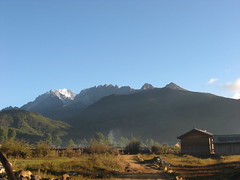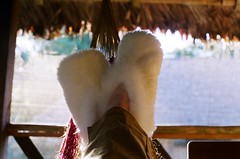I woke up early to the sounds of a cat crying insistently and of a German tourist telling the hostel worker her plans. Leaving my window open had been a mistake.
I gave up sleeping eventually, and showered and packed. The woman who worked there was no longer in the courtyard when I came out. No one had asked me for money the night before or even my passport, but no matter--Mama's Naxi Guesthouse was actually three guesthouses, and breakfast was served at a different one. I had a banana pancake there, actually a large piece of flat fried bread covered in sliced bananas, and paid for both the pancake and the room.
I was supposed to meet Cun Xuerong, the ecolodge manager, at 10:00 at a water wheel on the other side of the Old Town. My experience the night before had taught me that the Old Town is very difficult to navigate for the uninitiated, but miraculously, I arrived at 10:00 exactly. Mr. Cun, a handsome 30-something man with an urban air, found me quickly. He doesn't speak English, it turned out. I expressed surprise, since the emails from Wenhai had been signed with his name, but he said someone else had written them. The woman I'd talked to on the phone, surely.
We managed to communicate surprisingly well in Chinese, though. Perhaps Mr. Cun is used to talking to foreigners with a weak grasp of the language. Was I American? Yes. Was I working in China? I'd learned the word for "work" but forgotten it. I looked it up, then told him I didn't have a job in China, but was a tourist. Where had I studied Chinese, then? In college. Mr. Cun seemed pleasantly surprised to hear that colleges in America offer Chinese. He asked whether the instructors were Chinese or American. I said they were Chinese. It was by far the most successful conversation I'd had in Mandarin since arriving in the country.
Mr. Cun drove me in his Jeep to the foot of a mountain, where we waited for the guide and horse(s) to arrive. When I'd asked for the horse option I'd optimistically expected a guide on a horse, a horse for me, and perhaps a third animal for luggage, but now I worriedly watched a middle-aged man lead one small, dark, slightly mud-speckled horse out of the woods. Mr. Cun introduced me to Mr. He and told me to put my backpack on and mount the horse, which I did with some difficulty. The saddle was what I assumed to be the Naxi traditional style, unpadded with a hard loop of a handle in front.
I didn't particularly like being the tourist led along on a horse, but on our way up the mountain we saw Han tourists doing it too, and one middle-aged waiguoren couple. The path was steep, and the horse had to stop periodically to catch its breath. It wasn't long before my knees were stiff, my backside was sore, and I wished I were walking.
Mr. He is perhaps about 40, and small. He wore a battered sport coat, corduroys, and shoes resembling soccer cleats, plus a backpack with the vegetables Mr. Cun had bought for my meals. He didn't talk much.
We passed a dam, then a small reservoir. We crested the pass and soon afterward Mr. He suggested that I walk for the next stretch, which was particularly steep. I did so gladly, although my knees were so stiff I could barely walk at first. My dismount was no more graceful than my mount--I wasn't feeling like much of a martial artist.
Further down he had me get back on the horse, which moved away as I did. I joked that he didn't like me, but it wasn't really a joke.
As we neared the village we began to pass Naxi who weren't leading tourists on horses. Mr. He talked to all of them in a staccato language. We arrived at around 1:00, and Mrs. He cooked me lunch. It was simple and excellent: one plate of tomatoes and scrambled eggs, another of mushrooms and garlic, plus, of course, rice from a giant cooker.
But it soon began to seem to me that there was something off about the ecolodge. Mr. Cun had told me, when I asked him, that there were no other guests at the moment, and I hadn't expected luxury accommodations. but I had expected some sort of orientation. The Hes spoke no English, and the English-speaking woman I'd spoken to on the phone was nowhere in evidence. I'd have settled for a printout suggesting things to do, or even a patient explanation in Chinese and sign language, but it seemed that once I'd been shown my room and fed, I was on my own. Also, there was a distinct atmosphere of neglect: Huge cobwebs in the bathroom and hallways, plastic bottles piled under the stairs, and a receipt left in my room from the Grand Lijiang Hotel dating from early September.
Yet there was ample evidence that much care had gone into this place at one time. In the common room, where I ate, a sign announces that the lodge had been launched with funds from the Nature Conservancy and the Japanese government. The Nature Conservancy wanted to foster sustainable tourism in China to benefit the environment, and the Japanese wanted to show their friendship and help the people of Wenhai. Big framed posters, now dirty and faded, declaim in Chinese and flawless English on the philosophy of ecotourism, life in Wenhai, and regional flora and fauna. There are clipped articles on the lodge from the travel sections of the Daily Telegraph, the Far Eastern Economic Review, and the New York Times. These last two were both written in 2004 by the same freelancer, Craig Simmons. The articles sunnily describe the beauty of the setting, the difficulty of reaching the lodge, and its ecological amenities, which include solar panels, a biogas system, and a greenhouse. I wondered whether any of these were still working.
It was only 2:00, so I decided to do a little exploring. On my way out Mrs. He asked where I was going, and I answered truthfully that I didn't know. Perhaps I should have tried to provide more information.
I ambled around Wenhai Lake, which I'd learned is a seasonal lake, although I'm not quite clear on when it disappears. The only wildlife I spotted was a toad, but there were more free-roaming domestic animals than I'd ever seen before in one place: pigs, chickens, dogs, horses, cattle. I even saw some yaks, the first I'd ever seen outside of a zoo. The lake, the tiny streams that feed it, and the mountains--especially Jade Dragon Snow Mountain--made for some beautiful views. Time seem to melt away: Every time I looked at my watch, another hour had elapsed.
I got back to the ecolodge as it was growing dark, and Mrs. He served me three dishes this time, plus the ubiquitous tea (with a huge thermos for refills). As I was eating Mrs. He came in and handed me a cell phone. It was the English-speaking woman I'd talked to the day before. I don't know what she sounds like in Chinese or Naxi, but in English she comes across as strident.
"Hello? How are you?" with preliminaries out of the way, she asked me what I planned to do the next day. I said I didn't know. She told me I could walk around the lake and village by myself, but to go further afield I would need a guide. I didn't argue about that. She said that my options for the next day included climbing a mountain or walking to some Yi villages. Weighing this, I asked how far away the villages were. "Two are close, but two are farther away. But if you get tired you can just tell the guide, he'll take you home." I asked how difficult the climb up the mountain was. "If you get tired, I think you can tell Xiao He "hui jia," or you can speak to him in English, because he has guided many foreigners and I think maybe he understand you." This response seemed unecessarily patronizing--of course I could tell Mr. He "hui jia"--but if could communicate so well with the Hes, why was she calling me? I said I'd like to visit the Yi villages, and handed the phone back to Mrs. He.
The temperature dropped quickly after sundown, and the lodge was unheated, so I headed upstairs soon after dinner, taking the massive thermos with me. Next to my room was a door to the roof, and I went out. Here were the famous solar panels, or two of them anyway. One had a towel drying on it. On the wall were what appeared to be the panels' control or monitoring devices, but their digital displays were dark. Just to the side of the roof was a greenhouse I'd read about on an informative poster in the bathroom. In addition to nurturing vegetables, it was supposed to keep the biogas digester warm in winter so that it would keep working. But its clear plastic roof was almost entirely torn away, and the floor had been reclaimed by weeds.
I was sitting in bed reading about the Naxi in Lonely Planet when Mrs. He knocked at the door. I found her very difficult to understand. She asked whether I had a question or problem. I said no. She said something about the phone call. I tried to say yes, the woman on the phone and I talked about my going to the Yi villages tomorrow. She asked me something that I didn't understand. She said never mind, go back to sleep. Confused, I went back to bed.
Subscribe to:
Post Comments (Atom)


1 comment:
Glad you made it to Wenhai, but the eco-lodge isn't run by a co-operative of villages anymore. TNC still make a big deal out of it as showing small-scale tourism, but few stay there. The Japanese government retro-fitted the place, but few of the improvements - the methane converter, the glasshouse, etc - seem to work.
The road was put in a few years ago. The guides who trained up in the village didn't get any work, so went to Lijiang.
More at www.travelpod.com/travel-blog/happysheep/shangri-la-la/tpod.html
Post a Comment